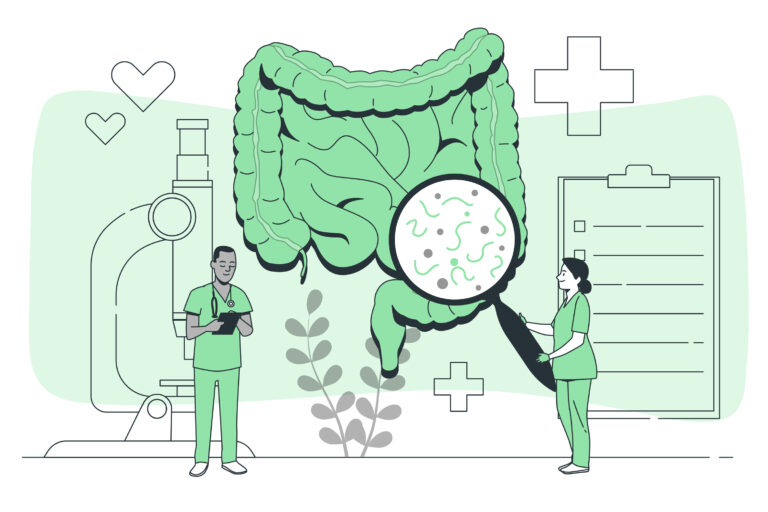- Phone 407-586-5677
- Email: [email protected]
- Fax : 407-956-2425
Until something feels off, digestive health is often taken for granted. Bloating, discomfort, or sudden changes in bowel habits can all indicate that your gastrointestinal (GI) system requires attention. Gingival and stool tests are one of the most efficient and non-invasive methods for evaluating your digestive health. Unseen infections, inflammation, and nutrient absorption issues may be discovered through these tests. We’ll talk about what GI and stool tests are, how they work, and what to expect during the process in this blog.
Digesting food, absorbing nutrients, and eliminating waste all require the gastrointestinal tract. Because of its connection to overall well-being, including mental health, it is frequently referred to as the “second brain.” Your body may have trouble absorbing essential nutrients if your gastrointestinal system is out of balance. This can have an effect on your energy, mood, and immune system, among other things. Because of this, GI testing is increasingly being used for both illness diagnosis and health maintenance.

Diagnostic instruments that are used to assess the health and function of your digestive system include stool and gastrointestinal tests. The majority of these tests require a stool sample to check for a variety of conditions. These tests can look for Infections caused by
Doctors are better able to comprehend underlying issues that might be causing symptoms like gas, bloating, diarrhea, constipation, or fatigue by analyzing these factors.
There is more than one kind of GI test. Different kinds of stool tests may be suggested based on your symptoms and concerns.
This advanced test looks at a lot of digestive markers, like enzymes, pH balance, and whether or not there are any good or bad bacteria. It is ideal for identifying imbalances in the gut and chronic digestive issues.
This test looks for occult (hidden) blood in your stool, which could be a sign of colorectal cancer or gastrointestinal bleeding earlier than others.
This test can assist in the detection of parasites like Giardia and Entamoeba in your stool if you have recently traveled abroad or are concerned about a parasitic infection.
The test for calprotectin is used to find inflammation in the gastrointestinal tract, especially to diagnose Crohn’s disease and ulcerative colitis.
The presence of pathogens, normal flora, and opportunistic bacteria can all be determined by this DNA-based stool test. Practitioners of functional medicine frequently make use of it.
The procedure is typically non-invasive and straightforward. Your healthcare provider or laboratory will typically provide you with a sample collection kit. What typically occurs is as follows:

You don’t have to wait until you have serious symptoms to think about these tests. In point of fact, they are extremely beneficial to many people who have minor or ongoing issues. Consider taking a test if you:
When examined, the test results may reveal:
Probiotics, dietary modifications, antimicrobial herbs, and prescription medications are frequently included in these insights-based treatment plans.
Your healthcare provider will likely recommend a customized plan based on your specific findings once your results are in. This might include:
While treatment can be different, the end goal is usually the same: better digestion and overall health.
No. The majority of stool tests don’t require any surgery and can be done from the comfort of your own home. Simply gather a sample and submit it.
2. Do I need to stop taking any supplements or medications before I can test?
Your results may be affected by some medications, especially antibiotics and probiotics. Before testing, it’s best to follow your doctor’s instructions.
3. What is the accuracy of stool tests?
Utilizing DNA technology, advanced GI tests like GI-MAP are regarded as highly accurate. The test and collection method, on the other hand, can have an impact on accuracy.
4. How frequently should I take a test?
Testing once or twice a year might be helpful for people who have problems that last a long time or are on long-term treatments. It all depends on your health goals for preventive care.
5. Will the tests be covered by insurance?
Your provider and the reason for testing determine coverage. Sometimes, functional tests are not covered. Before doing anything, always check with your insurance.
Despite its importance to your well-being, gut health is frequently neglected. Stool and gastrointestinal testing provide a comprehensive picture of your digestive system. Using these insights, you can create targeted, efficient treatments to bring your body back into balance and make you feel better every day. Many chronic symptoms can be identified and managed before they progress into more serious conditions by proactive use of stool tests. While lifestyle and diet may contribute to some discomfort, more complex causes, such as microbial imbalances or infections, are typically only discovered through extensive testing. Stool testing is an important first step toward better health, whether you’re having symptoms or just want to stay ahead of potential problems.